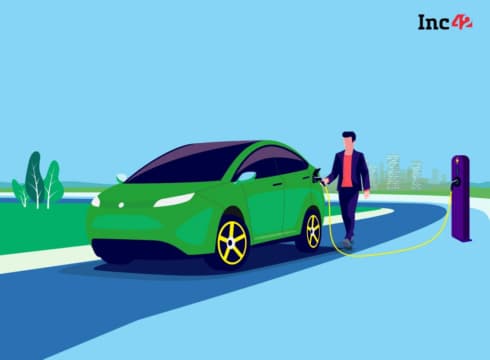Draft rules framed after consultation with over 40 companies including Ola, Uber, Flipkart and Amazon
Target for the adoption of two and three-wheeler EVs in the new fleet set at 50% within 2 years of operations
Draft rules impose license fees on tech aggregators for onboarding fossil-fuel run vehicles. However, no license fee for onboarding EVs. Draft also caps surge pricing at twice the base fare
Inc42 Daily Brief
Stay Ahead With Daily News & Analysis on India’s Tech & Startup Economy
Delhi government has issued draft guidelines to regulate the transportation activities of tech aggregators. The draft scheme will cover various tech startups ranging from food delivery to mobility and ecommerce.
The draft guidelines were issued after due deliberations with 40 startups including Ola, Uber, Flipkart, Amazon and Ninjacart. Under the new scheme, all tech aggregators will have to apply for a license to ply on Delhi roads.
The move aims to bring transparency in pricing and ensure adequate customer service in the sector.
Electrification of the fleet has been given heavy importance in these new draft rules. The tech aggregators will have to electrify 10% of their new two-wheeler and three-wheeler fleet within 6 months of being granted license. The target will subsequently increase to 25% in the next 6 months and finally, the aggregators will have to electrify 50% of their fleet within 2 years of being granted the license.
On the same lines, the target for adoption of EVs in the new four-wheeler fleet has been set at 5% within 6 months from the date of granting of license. The target will increase to 15% in the next month and subsequently, 25% of the new four-wheeler additions in the tech aggregators’ fleet will have to be 25% by the end of 2 years.
The tech aggregators have been told to mandatorily onboard electric vehicles. The draft norms mention strict penalty for those aggregators flouting the norms. Those violating the targets could face severe consequences, including a fine of INR 1,000 per vehicle per day till it complies with the order. The aggregators could also face suspension of the license if they fail to meet their targets.
The draft guidelines also envisage license fees based on the fuel composition of the fleet onboarded by the tech aggregator. EVs have been given rebate in this regard while petrol-based two-wheelers will invite INR 250 per vehicle. Similarly, a petrol-run three wheeler will invite a license fee between INR 800-1000. For petrol run cars, a license fee of INR 650-1000 will be chargeable per vehicle.
The draft norms also specify security deposits for aggregators. Companies with upto 1,000 vehicles will have to pay INR 1 Lakhs as deposit while for aggregators having vehicles between 1,000 and 5,000 will have to shell out INR 2.5 Lakhs. Similarly, onboarding vehicles between 5,000 and 10,000 will entail a deposit of INR 5 Lakhs and aggregators with more than 10,000 vehicle fleet will have to pay INR 10 Lakhs as security deposit.
The draft guidelines have also cracked the whip on tech aggregators over surge pricing. The draft rules allow aggregators to surcharge consumers but have capped the ‘surge pricing’ at twice the base fare.
The draft norms have been prepared based on the 2020 draft guidelines for tech aggregators issued by the Ministry of Road Transport and Highways. Delhi Government claims that it is the first in the country to create such a framework based on the guidelines issued by the Centre.
This comes barely a week after Delhi’s Environment Minister, Kailash Gahlot, had directed the tech aggregators to ensure a smooth transition to electric vehicles.
The draft guidelines have now been put in the public domain for the next 60 days to invite opinions from civil society members.
The move is part of the National Capital Territory’s move to an all-electric future. The move makes sense as fossil fuel emissions add to the burgeoning pollution in Delhi.
As per World Economic Forum, the demand for urban last-mile delivery is likely to increase by 78 percent by 2030. Back home in India, the trend is expected to be led by ecommerce and mobility startups that do the bulk of the heavy lifting but questions remain over the viability of EVs amid complicated bureaucratic red tape.
The renewed push comes as India rushes to fulfil its obligations under the global EV30@30 campaign. India is a signatory to it which sets a collective goal of reaching a 30% sales share for electric vehicles by 2030.
Complicating matters, India was the world’s fourth-biggest emitter of carbon dioxide with over 1.9 tonnes of CO2 per head of population in 2019. To achieve this goal, it is imperative for the country to bolster steps to ensure that more and more of the population embrace EVs.
{{#name}}{{name}}{{/name}}{{^name}}-{{/name}}
{{#description}}{{description}}...{{/description}}{{^description}}-{{/description}}
Note: We at Inc42 take our ethics very seriously. More information about it can be found here.


